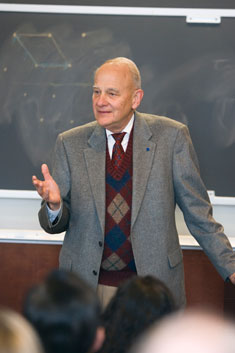
"Darwin said it's not the strongest that survive but the ones most adaptable to change," said William Wulf at the Spring Engineering Dean's Lecture. Photo: Joanie Tobin
Innovation Nation
To keep the United States on the leading edge of technology, we need public policies that encourage continual advances, scientist says
By Marjorie Howard
For our country to thrive, we need a highly educated work force and a culture that encourages risk taking. But risk taking that leads to innovation, said William Wulf, president emeritus of the National Academy of Engineering, requires changes in current laws and regulations that protect the public but discourage experimentation.
Speaking at the Spring Engineering Dean's Lecture on April 9, Wulf described the necessary components of what he called innovation ecology, a set of circumstances that supports advances and change, including a process for regularly examining public policies that regulate technology development.
"Like natural ecology," he told an audience of students and faculty in Nelson Auditorium, "each element of innovation ecology fills some niche, and it all works best when each element works effectively. It is a set of independent yet interacting and interdependent things. As the environment changes, the elements of the ecology had better change, too. Darwin said it's not the strongest that survive but the ones most adaptable to change."
Many U.S. policies dealing with innovation are out of date and no longer relevant to technological discoveries, he argued. "The elements of our innovation ecology have not adapted; beings that don't adapt in natural ecology die, so this is not a trivial matter," said Wulf, the AT&T Professor of Engineering and Applied Science at the University of Virginia.
Take the patent system, which began some 200 years ago. "It was invented for physical machines," he said. "It would be surprising if it was perfect for software, snippets of DNA, pharmaceuticals, all of which are covered by patent law." Wulf noted that Craig Barrett, the chairman of the board of Intel, has said that 90 percent of Intel's revenues in a given year come from products that did not exist at the start of that year. "In that context, multi-year intellectual property protection is irrelevant," said Wulf.
A second component of innovation technology is copyright. Wulf said the copyright system worked well when it was for physical media such as paper or canvas, but no longer makes sense in the digital world. Web pages, for example, may have copyrights, yet to appear on a viewer's monitor, the page has to be copied several times on servers and routers, violating the copyright. "That page would have zero value if it hadn't been copied, because it would stay stuck on the hard drive of a server, and no one would ever see it."
Wulf said that a third component, antitrust laws, were created at the end of the 19th century in an entirely different economic context, when scarcity created value. "For certain software, that economic theory is turned on its head," said Wulf, who developed the systems programming language BLISS and is a fellow of the American Association for Advancement of Science.
"Ubiquity implies value. If you have the only telephone in the world, it's not very valuable. In fact, it reaches its maximum value when everyone has a telephone. . . . I don't think any of us could argue Microsoft doesn't have a huge monopoly. I don't use it because it's the cheapest or most bug-free, but because there's a really good chance that if I attach a file to a document and send it, you'll be able to open it and send it back. It's the ubiquity."
Wulf cited tax credits for research and development as another example of misguided public policy. Such credits have "zero impact" on any research manager's decisions, he said, because research takes many years, yet the credits must be renewed on a year-to-year basis. "If I have a credit in one year, and then it goes away the next year, it makes no sense. It only works if there's an assurance of a reasonable number of years, maybe 10."
What is needed, Wulf said, is an institutionalized process for revisiting the policies that regulate technological advances, something that doesn't necessarily change the laws and rules rapidly but allows them to be re-examined on a periodic basis.
Wulf was asked during the question-and-answer session how he would go about establishing such a system. He responded that he would create an ad hoc committee of experts, and added, "I wish I had that problem."
Marjorie Howard can be reached at marjorie.howard@tufts.edu.


